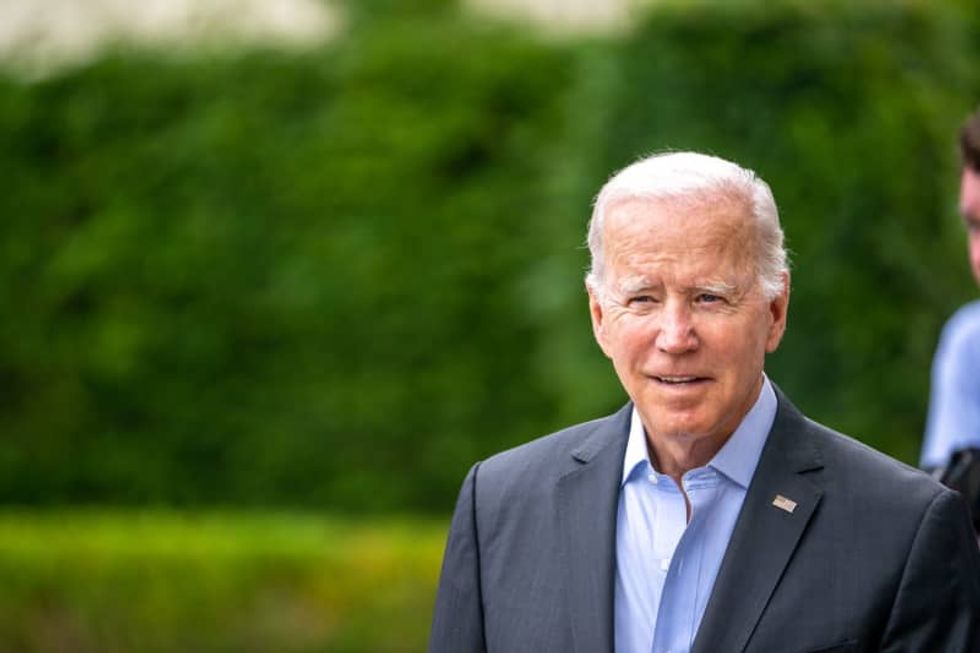Enough of this gaslighting BS
The Republican budget bill that recently passed the House adds onerous work requirements that would push millions of people off Medicaid. House Speaker Mike Johnson told “Meet the Press” last weekend that they’d only lose their healthcare if “they choose to do so.” But that, according to Charles Gaba, is “gaslighting bull–––t.”
“The entire point of imposing work requirements,” Charles told me, “is to either discourage eligible people from enrolling or to make the requirements difficult to comply with, resulting in millions being kicked off the program even if they are working or volunteering.”
Gaba is “the biggest powerhouse Democratic donor wrangler that nobody has ever heard of,” according to Politico. As the editor and publisher of ACAsignups.net, he’s also one of the country’s leading authorities on Obamacare, Medicaid and healthcare policy.
After the House Republicans passed their budget bill, I got in touch with Charles. I asked him straight up if the legislation guts Medicaid.
Yes, he said, but it does so much more harm than that.
If the congressional Republicans do not extend insurance subsidies passed during the pandemic, Obamacare enrollees will “face massive premium hikes — in many cases, three and four times higher than what they're paying right now,” he said.
That’s impacting some 24 million Americans — most of them, Charles reminds me, residing in red states.
The following is a long interview, but vital to anyone with a stake.
JS: Are the Republicans really going to gut Medicaid? Huge numbers of people who voted for and who support Donald Trump depend on it.
CG: The version of the budget bill passed recently by House Republicans absolutely would, if implemented, gut Medicaid — particularly for around 20 million Americans who are currently enrolled in Medicaid via the Affordable Care Act expansion that’s in effect across 41 states.
Obviously, there will be changes made to it in the Senate, so we don't know what the final version of the bill will be, and even if it passes through both the House and Senate, and is signed into law by Trump, there will no doubt be legal challenges to some provisions within it.
But yes, the current version passed by House Republicans would be pretty devastating to both Medicaid as well as ACA exchange enrollees.
There has been less attention to those ACA exchange enrollees. What does the budget bill do to the Affordable Care Act? What do those changes say about Trump and the GOP’s plans for the safety net?
The first way the budget bill hurts the ACA is what it doesn’t include — extending the improved tax credit formula under the Inflation Reduction Act (IRA), which is scheduled to expire at the end of this year.
If the IRA subsidies expire this year, nearly all of the around 24 million Americans enrolled in healthcare coverage via the ACA exchanges will face massive premium hikes — in many cases, three and four times higher than what they're paying right now.
Millions will be priced out of being able to afford coverage at all, while most of the rest will have to either eat the higher premiums, downgrade to a lower-quality plan with higher deductibles, higher copays, a worse provider network or all of the above. Or they'll have to move to non-ACA coverage via so-called "junk plans," which have few if any of the patient protections required by ACA plans.
That’s what the budget bill doesn’t do to the ACA. What does it do?
It makes a bunch of changes to how ACA exchange enrollment and tax credit eligibility work. Some of these get pretty wonky, and some would "just" be codifying rules that are already being put into place by the Trump administration, but the list includes things like:
- Denying tax credits via ACA exchange plans to anyone who (ironically) gets kicked off of Medicaid for failing to meet the new "work reporting requirement" provisions.
- Changing the ACA's formula for determining "maximum out of pocket" costs (MOOP), so that enrollees would face hundreds of dollars in higher deductibles and copays.
- Weakening the ACA "metal level" rules to let insurance carriers make plans less comprehensive (ie, silver plans are supposed to cover around 70 percent of average enrollee costs; under the GOP changes, a silver plan cold cover as little as 66 percent.)
- Cutting the open enrollment period nearly in half, from the current 76 days down to 45 days.
- Mandating a $5 per month premium on some low-income enrollees who are currently eligible for $0 per month premiums.
- Adding a whole bunch of extra red tape to millions of enrollees for them to remain eligible for tax credits.
All of this illustrates Trump and the GOP's disdain for and hatred of the social safety net as a whole: If they can't get rid of it outright, they'll deliberately make it too cumbersome and complicated to work, thus allowing them to claim government itself doesn't work.
Or, as PJ O'Rourke once put it: The Republicans are the party that says government doesn't work and then they get elected and prove it.
How are the Republicans going to justify taking health insurance away from people or making what they do have worse than it is?
GOP House Speaker Mike Johnson has repeatedly used the "lazy young men playing videogames" stereotype, as who he claims they want to force into "getting off the couch to get a job" etc, even though there's no evidence that a lack of healthcare coverage inspires young men to seek employment and plenty of evidence that providing healthcare coverage to people makes them more likely to get and keep a job.
They're also trying to claim that millions of undocumented immigrants are "stealing" healthcare even though federal dollars don't pay for Medicaid for any undocumented immigrants. There's a few states that pay for Medicaid for that population using 100 percent state dollars, which is entirely up to the voters of those states. Yet the House Republican bill tries to blackmail those states into not paying for Medicaid for undocumented immigrants by threatening to withhold federal dollars for US citizens and documented residents if they don't.
I'm going to be generous and say Trump voters seem confused. A recent report by NPR suggested that they don't want Medicaid cuts for people they know, but do want cuts for some kind of make-believe freeloader. This seems to me a recipe for continued support for Trump, even as he's hurting his own people. Thoughts?
Sadly, that sounds likely to be the case. I listened to and read the NPR piece you mentioned, and everyone who talked about "waste" or "abuse" spoke in very vague terms without ever specifying who exactly they think is "abusing" or "wasting" Medicaid dollars.
In addition, they seem to simply flat-out refuse to believe that Republicans and Trump will take away their healthcare, because "that wouldn't be right" and "I need it," regardless of what's in the bill.
I've even read other articles where Trump supporters shrugged off the potential loss of Medicaid/ACA coverage, because they figured that Democrats would stop or reverse the cuts from happening, which seems like a rather twisted sort of justification for supporting Republicans.
That seems to be happening in the interplay between the House and the Senate. Trump voters want cuts for "those people." So the House bill passed. They don't want cuts for themselves. So the bill is stalling in the Senate. I don't know what any Democrat could say to Trump voters when the point for them is theater, not solving problems.
I know that Sen. Josh Hawley (R–MO) has been vocal about opposing any major cuts to Medicaid while Sen. Lisa Murkowski (R-AK) has openly called for the IRA subsidies to be extended.
The House GOP bill does a lot to try to punish Democrats more than Republicans, but it would still be pretty devastating for millions of Republicans no matter what, making it difficult to square the circle.
While I noted there are more Medicaid expansion enrollees in blue House districts, there are more ACA exchange enrollees in red House districts, and even within those, there's still no way of knowing for certain whether a particular enrollees is a "one of their own" or not.




